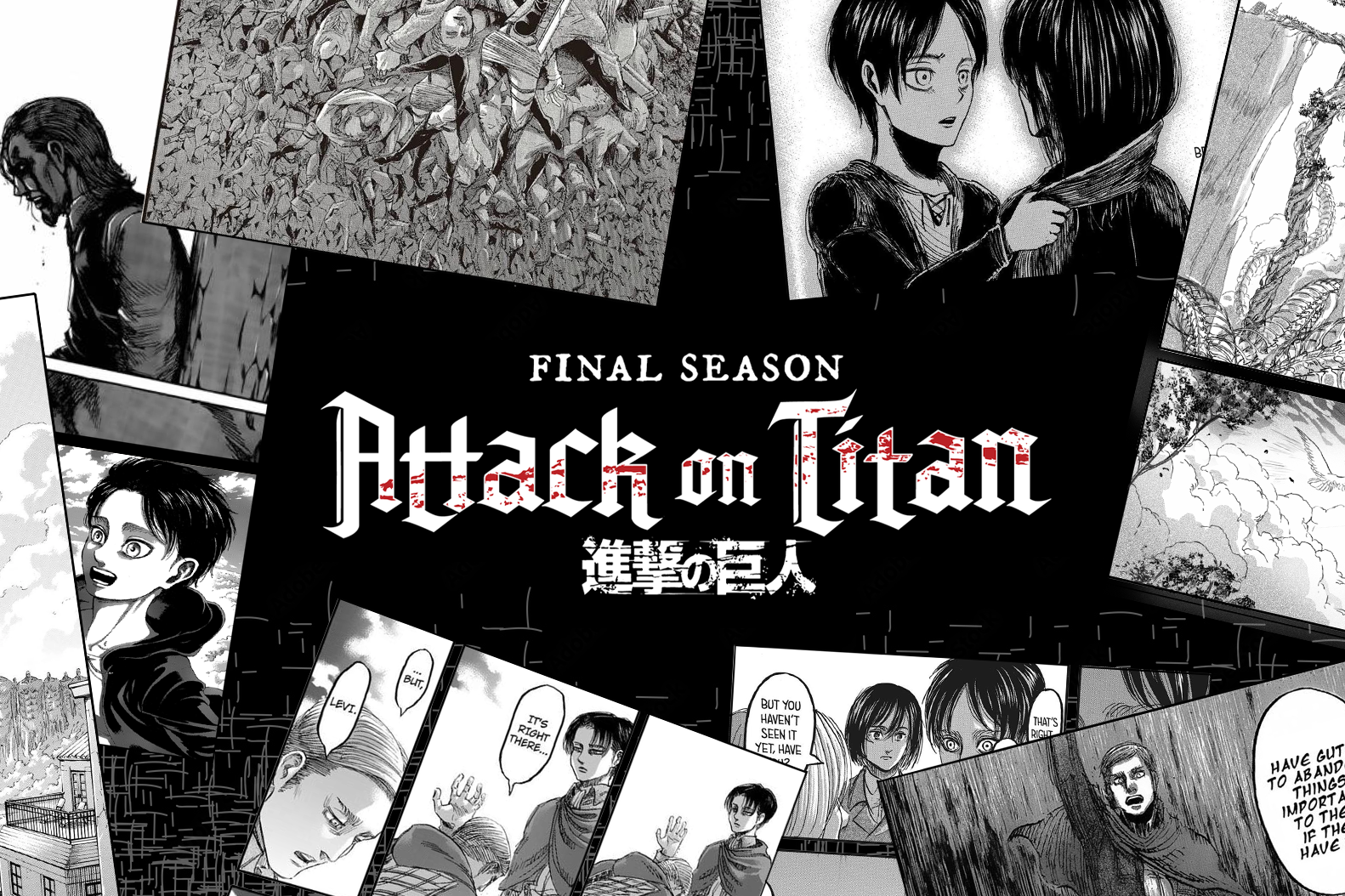Attack on Titan, the popular anime that has taken the world by storm is set in a grim, alternate history, where mindless, ravenous giants roam the land and the last remnant of humanity is trapped behind enormous walls. But what does a series about vicious flesh-eating monsters and acrobatic warriors have to do with the Gospel?
Attack on Titan features a slew of despairing questions and Pyrrhic fantasies amid a cruel world that aches for good news.
As C.S Lewis astutely puts it: “Now the story of Christ is simply a true myth: a myth working on us the same way as the others, but with this tremendous difference that it really happened: and one must be content to accept it in the same way, remembering that it is God’s myth where the others are men’s myths: i.e., the Pagan stories are God expressing Himself through the minds of poets, using such images as He found there, while Christianity is God expressing Himself through what we call ‘real things’.”
It is thus this author’s opinion that Attack on Titan, just as all great works of fiction are, is an echo of the eternity engraved upon human hearts. It features a slew of despairing questions and Pyrrhic fantasies amid a cruel world that aches for good news. It portrays a world that demands the majesty and the beauty of the Christian Gospel. I go about to lay this out in three parts: slavery, sin and sacrifice.
SPOILER ALERT: Colossal spoilers below
On slavery
“Everyone I’ve met was all the same… Everyone had to be drunk on something to keep pushing on. Everyone was a slave to something.” (Kenny Ackerman)
In a poignant moment in Season 3 Episode 10, the arc’s villain, Kenny Ackerman lies bleeding beneath a tree, slumped in defeat and divulging his life’s ambitions to his former protégé and now enemy, Levi.
In a stunning moment of self-aware epiphany, he coughs out the words above with his dying breaths, realising that all men are slaves to something; a truism that he himself is not spared from.
All his life, Kenny has sought what he views as ultimate power (the power of the Titans). His quest for power began with an attempted assassination of the King behind the Walls, Uri, who could have easily crushed Kenny between his Titan-sized fingers.
But his first encounter with the King culminates with the King prostrating himself before Kenny, to beg forgiveness for historical crimes against Kenny’s people. It is this image of Uri kneeling humbly before him, begging forgiveness, that haunts him to his dying breath.
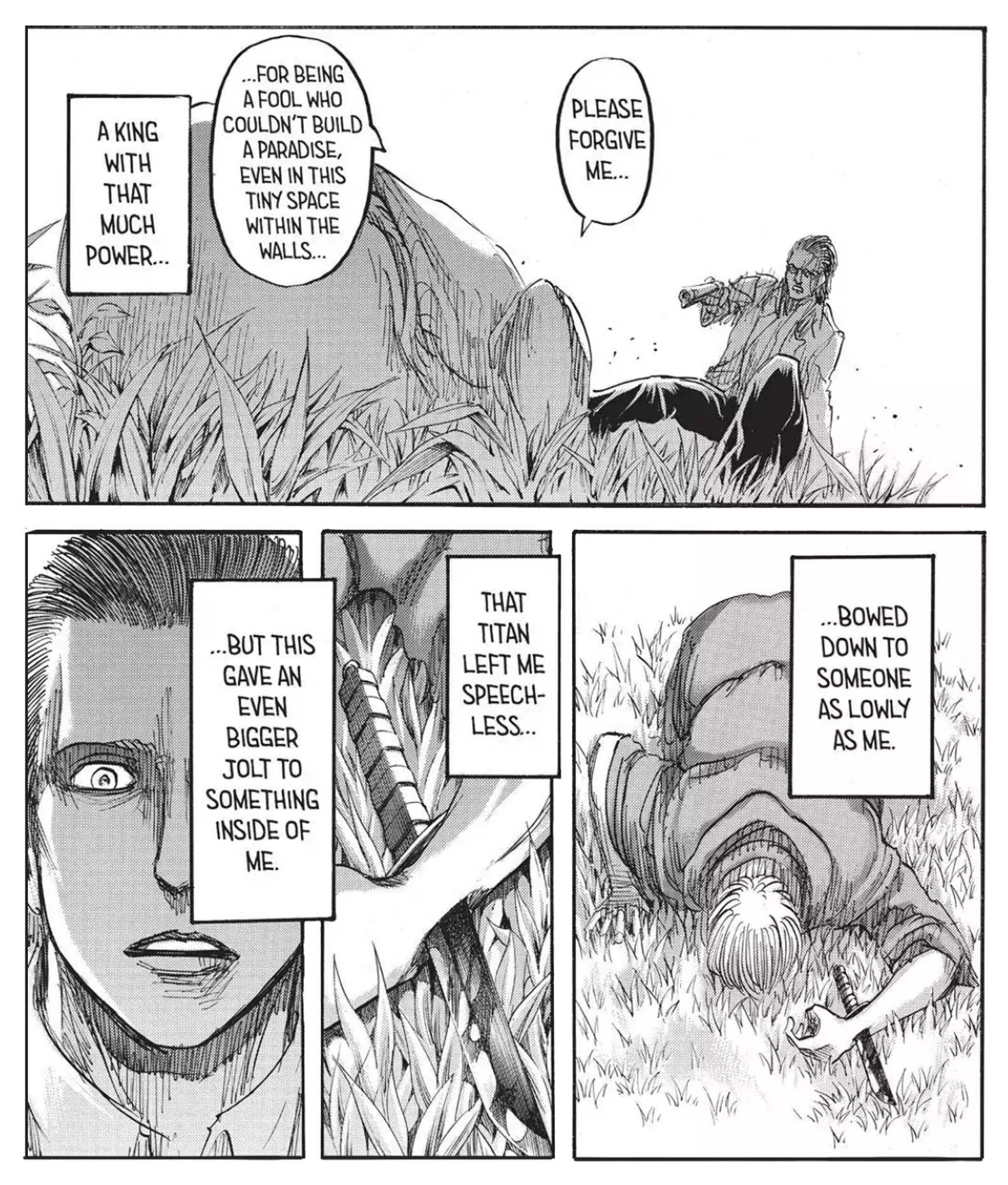
He wonders: “How does it feel? And what’s the view like from a place like that? [Can] scum like me see the same view that [Uri] did back then?”
Could someone like Kenny — someone who has cheated, stolen and murdered his way to the top — be capable of attaining that state of ostensible purity and tranquillity if he gained that ultimate power?
As this image flashes before him in his dying moments, it is then Kenny realises: Uri was a slave all his life despite all his immense power, and all humanity is doomed to be thrall to that something that keeps them “pushing on”.
Everyone is a slave to something, and everyone had to be drunk on something to keep them pushing on.
Kenny’s story acts as a foil to the protagonist of the anime, Eren Jaeger. Much like Kenny, Eren is fixated upon attaining something beyond his reach; he desires freedom, and he stops at nothing to achieve his glorious goal.
In earlier episodes, Eren’s picture of freedom is symbolised by the ocean. This sight, and therefore freedom, can only be attained when their enemies are killed, and humanity is no longer confined behind the walls.
After a brutal onslaught against the Titans that results in countless civilian casualties, the loss of hundreds of Scouts and incredible personal loss, Eren finally reaches the ocean. There, he gazes at the azure scene with blank eyes, taking in the sight that he had always dreamed of since he was a child, that he had sacrificed so much for; the sight of ‘freedom’.
However, instead of joy, Eren finds only melancholy. He laments, “Beyond the wall..there’s a sea. On the other side of the sea..is freedom. That’s what I always believed. But I was wrong. On the other side of the sea…are enemies. Hey.. if we kill all our enemies…over there…will we finally…be free?”
Eren finds out at the end that he was always a slave — a slave to freedom.
This obsession with freedom for his people sets Eren on a gruesome rampage against their enemies, culminating in a global genocide. He never finds the freedom he seeks for and, in a cruel twist of irony, Eren finds out at the end that he was always a slave — a slave to freedom.
Much like Eren and Kenny, we scale barricades, climb ladders and cross oceans to attain “true” satisfaction. We are all slaves to something, we are all “drunk” on something. The Bible reflects this truth in Romans 6:16, ESV:
“Do you not know that if you present yourselves to anyone as obedient slaves, you are slaves of the one whom you obey, either of sin, which leads to death, or of obedience, which leads to righteousness?”
The Bible recognises the same reality that we are all slaves to something but presents it in a dichotomy: you are either a slave to sin, or a slave to righteousness.
Much like the ideals that bring Kenny and Eren to ruin and despair at the ends of their lives, slavery to sin leads only to fruitlessness (Romans 6:21) and death. On the other hand, the Bible promises us that slavery to Christ gives us fruit in the form of “sanctification and its end, eternal life” (Romans 6:22, ESV).
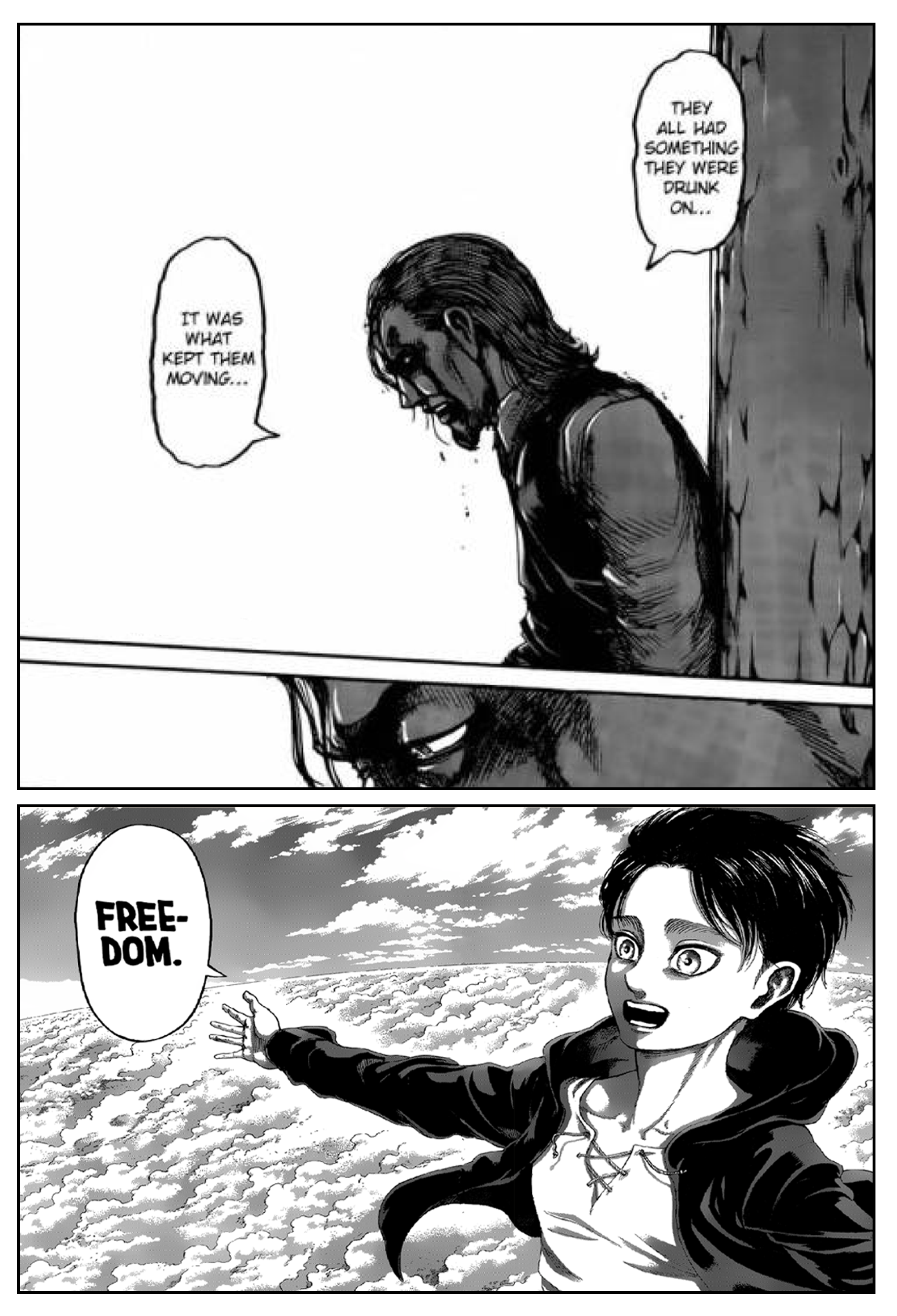
There is no escape from slavery to something, but there is slavery to a good and true Master.
Jesus says in Matthew 11:28-29: “Come to me, all who labor and are heavy laden, and I will give you rest. Take my yoke upon you, and learn from me, for I am gentle and lowly in heart, and you will find rest for your souls.”
Jesus rescues us from the yoke of sin we have laboured under and promises to be a gentle and lowly Master who gives us rest for our souls. He calls to those who push their own backs and keep moving forward to the hell before them (like Eren) and invites them to find rest in Him.
He cries out to us in Isaiah 55:1-2: “Come, all you who are thirsty, come to the waters; and you who have no money, come, buy and eat! Come, buy wine and milk without money and without cost. Why spend money on what is not bread, and your labor on what does not satisfy? Listen, listen to me, and eat what is good, and you will delight in the richest of fare.”
Jesus calls to the Erens and the Kennys, whose thirsts for satisfaction have destroyed themselves and those around them. He promises them living water and that they will never thirst again.
…you are either a slave to sin, or a slave to righteousness.
Much like Uri kneeling before Kenny, in Christ we see a God-king who humbled himself in the form of a man and won over His enemies. However, unlike Uri, who himself was a slave, Jesus promises us true freedom and true satisfaction.
All we have to do is yield to Him our allegiance, and become slaves to a good and gracious King.
On sin
“We just couldn’t come to terms with our sins,” weeps Bertholdt, as he pleads with his fellow scouts for forgiveness for the crimes he has committed.
Reiner splits himself into two with the crippling guilt of his betrayal, a guilt that haunts him throughout the series and drives him to despair. Zeke convinces himself that the only solution to atone for the sins of his people is to euthanise themselves with the power of the Founding Titan and pass slowly into extinction.
Throughout Attack on Titan, all the characters grapple with this problem of guilt and of sin. There is a sense of their own moral ruin, as the characters progressively stain their hands to achieve their various well-intentioned ideals.
This is a problem that Eren himself is confronted with, as he tears himself up in guilt over the countless lives he is going to extinguish in the name of freedom.
In one of the show’s songs, “Akuma no Ko”, we see a disturbing self-awareness as the personification of Eren admits that “Behind justice, inside of sacrifice; There is a child of evil inside my heart”.
What Eren admits about himself is true to every human being that walks this earth. We are Man, and that is, as C.S Lewis writes, “honour enough to erect the head of the poorest beggar, and shame enough to bow the shoulders of the greatest emperor on earth”.
Honour because we are made in the image of God, and have the capacity for great good and compassion. Shame, because “all we like sheep have gone astray “ (Isaiah 53:6), and we all have all “fallen short of the glory of God” (Romans 3:23).
While most of us will likely never face the exigencies nor possess the power that would impel us to commit the horrendous evils the anime’s characters muddy their hands with, we cannot help but admit that there is, likewise, a “child of evil” inside all of us.
Contrary to Nietzche’s prediction that the “death” or the perceived cultural unavailability of God would see a “decline in the consciousness of human debt”, our sense of our moral ruin has not diminished with modernity.
Virtue signalling, doomscrolling through news about “bad” people or seeking validation from social media are poor panaceas that do little to assuage this awareness of our own inadequacy.
Sin has broken the relationship between humanity and God and blighted us with a fallen state. As Psalm 53 aptly avers, “None is righteous, no, not one; no one understands; no one seeks for God”.
It is not only moral ruin that sin has brought about, but also the corruption of creation.
Mikasa laments, “the world is cruel and merciless… But it’s also very beautiful”. Armin pines for the sights of “flaming water, land made of ice, and fields of sand spread wide”, but the final sight of these natural wonders holds hollow comfort for him when he is confronted with the demise of his greatest friend, Eren.
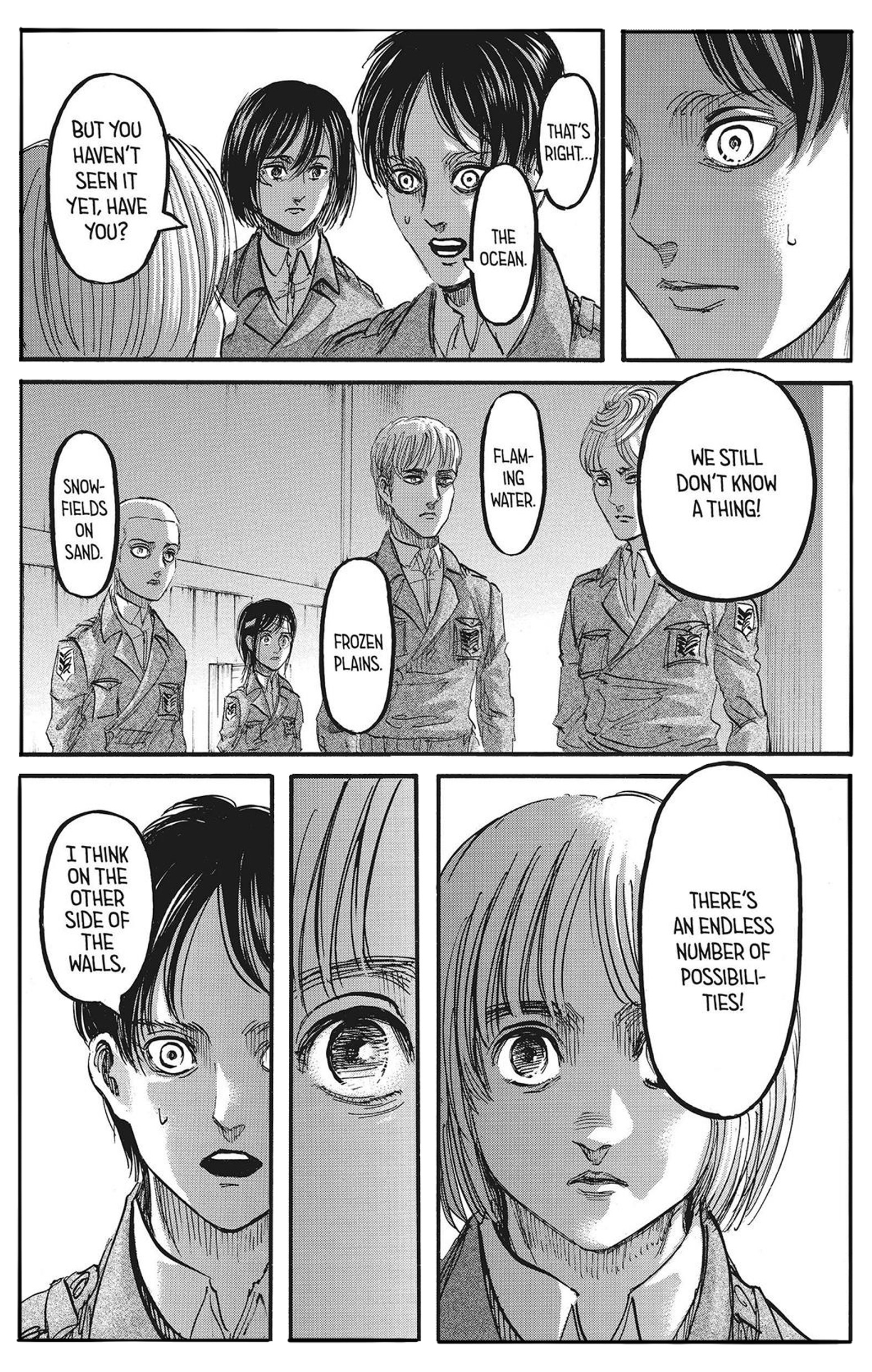
We resonate with the characters of the show when the piercing bolt of sin undercuts our enjoyment of this flawed creation.
As Romans 8:22-23 puts it: “For we know that the whole creation has been groaning together in the pains of childbirth until now. And not only the creation, but we ourselves, who have the firstfruits of the Spirit, groan inwardly as we wait eagerly for adoption as sons, the redemption of our bodies.”
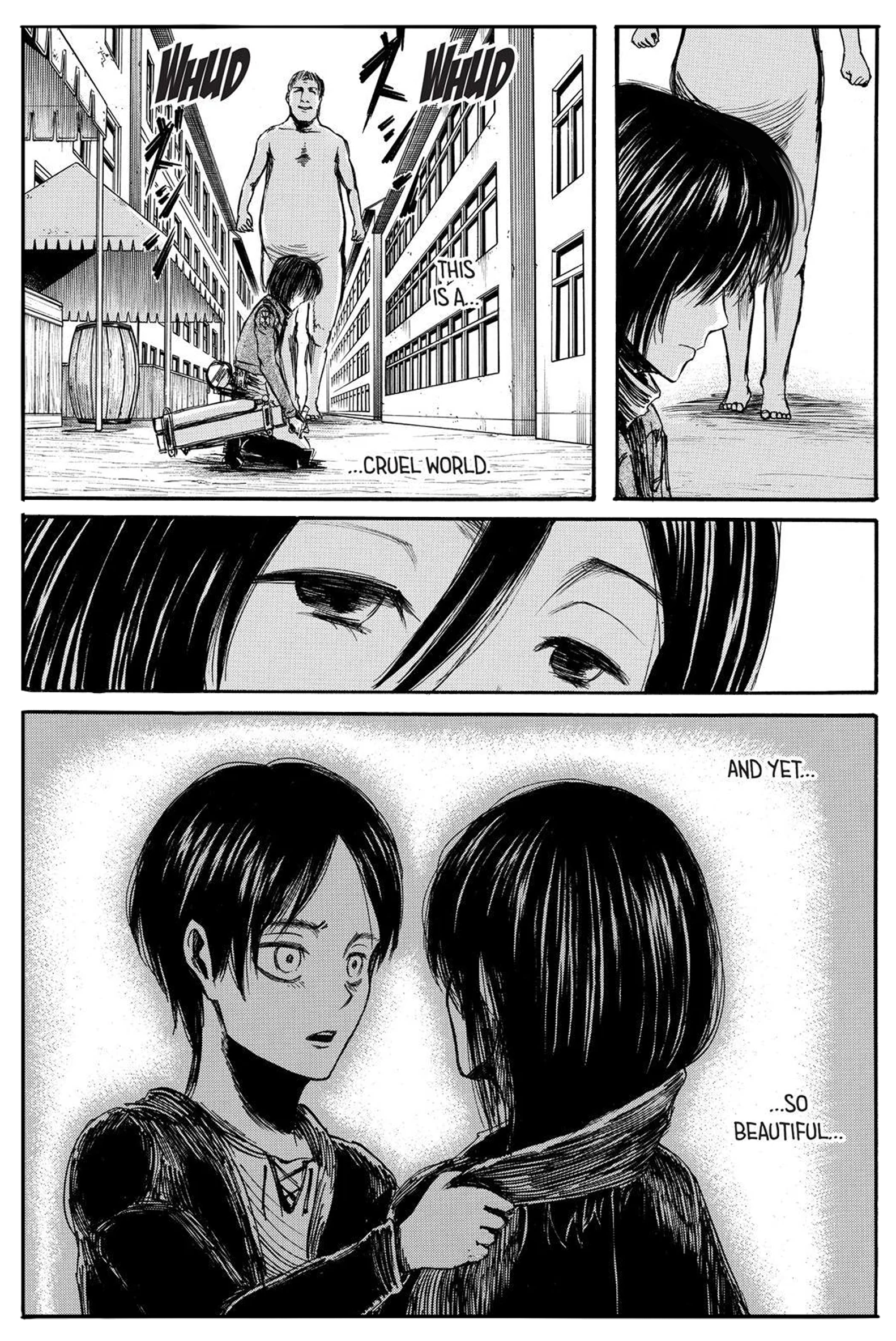
This world is cruel, but very beautiful.
We long for a world free from sin and its consequences, the redemption of our fallen creation. We love meat, baseballs, autumn leaves and the world of people behind our walls. We groan under the weight of hunger, fatigue, grief and racism.
As the late pastor Tim Keller puts it: “There is nothing better than ordinary life, except that it’s always going away”.
Ordinary, beautiful life is always going away under the curse of sin, because of the evils within us and without.
In the story of Attack on Titan, there is no answer to this conundrum. Bertholdt’s desperate cry for salvation, for “Someone, to save us!”, is left unanswered.
But such a cruel fate does not await us who have placed our hope in Saviour, Jesus Christ. As Tim Keller says, “God loves this world so much He gave His only Son so we—and the rest of this ordinary world—could be redeemed and made perfect. And that’s what is in store for us.”
God promises us a Creation free of sin and restored to what it was meant to be, as He says in Isaiah 55:6-8:
“On this mountain the LORD of hosts will make for all peoples a feast of rich food, a feast of well-aged wine, of rich food full of marrow, of aged wine well refined. And he will swallow up on this mountain the covering that is cast over all peoples, the veil that is spread over all nations. He will swallow up death forever; and the Lord GOD will wipe away tears from all faces, and the reproach of his people he will take away from all the earth, for the LORD has spoken.”
In Christ, a broken world becomes beautiful in His time. In Christ, the child of evil within us becomes a child of God. In Christ, we finally, and truly, come to terms with our sins.
On sacrifice
“Shinzou wo Sasageyo!” (dedicate your hearts) cry the Scouts as they valiantly charge to their doomed fates. The concept of sacrifice and the giving up of lives is a sanguine thread that weaves its way through the show.
From a momentous scene in the first season where Eren heroically flings himself into a titan’s mouth, to Hange’s final blaze of glory, the necessity of sacrifice is a reality that the characters consign themselves to in almost Sisyphean resolve.
As Armin rightly points out near the beginning of the show, “Someone who can’t sacrifice anything, can never change anything”.
There is a recognition that sacrifice is necessary to achieve positive change, and Armin himself goes on to live out this philosophy by yielding up his life to slay the Colossal Titan.
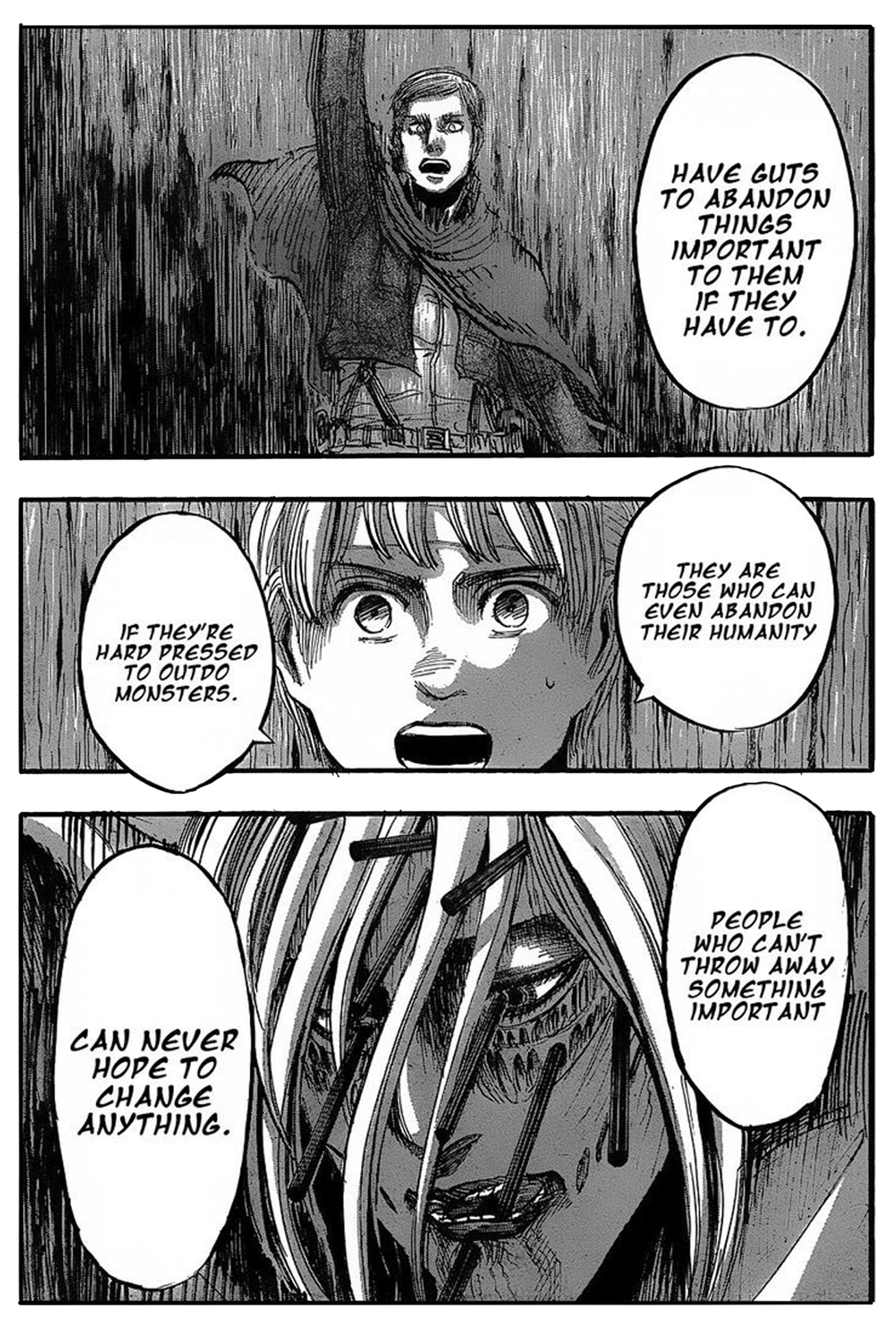
Just over the wall during that sacrificial scene, Commander Erwin leads his soldiers into a charge to their deaths, resting the meaning of their sacrifice upon the slight sliver of hope that Levi can assassinate the Beast Titan in single combat.
Before he gallops to his death, he counsels both himself and the recruits of the Survey Corps: “We die trusting the living who follow to find meaning in our lives!”
Erwin thrusts his own corpse upon the pile of corpses that has paved the path of the Survey Corps to freedom, only for his sacrifice to amount to almost nothing as the Beast Titan escapes the clutches of Levi to live another day.
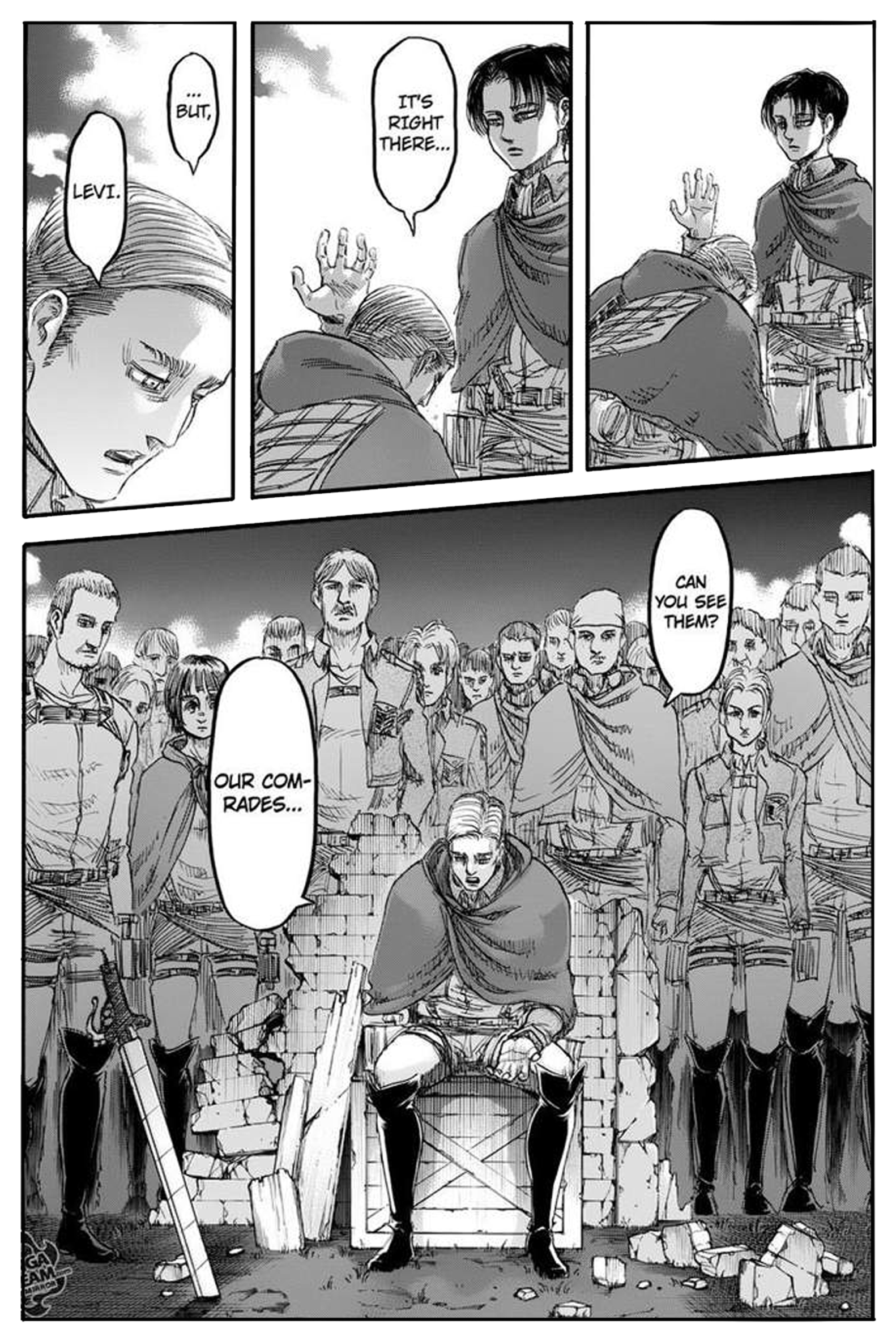
Armin is right to point out the terrible desideratum of sacrifice.
However, the show also acknowledges that sacrifices, no matter how grievous a toll they extract from their givers, rarely produce a victory commensurate to their cost.
The crutch that Erwin leans upon to soldier on to his demise is the pathetic, fragile wish that the living would reap fruit from their crushed corpses.
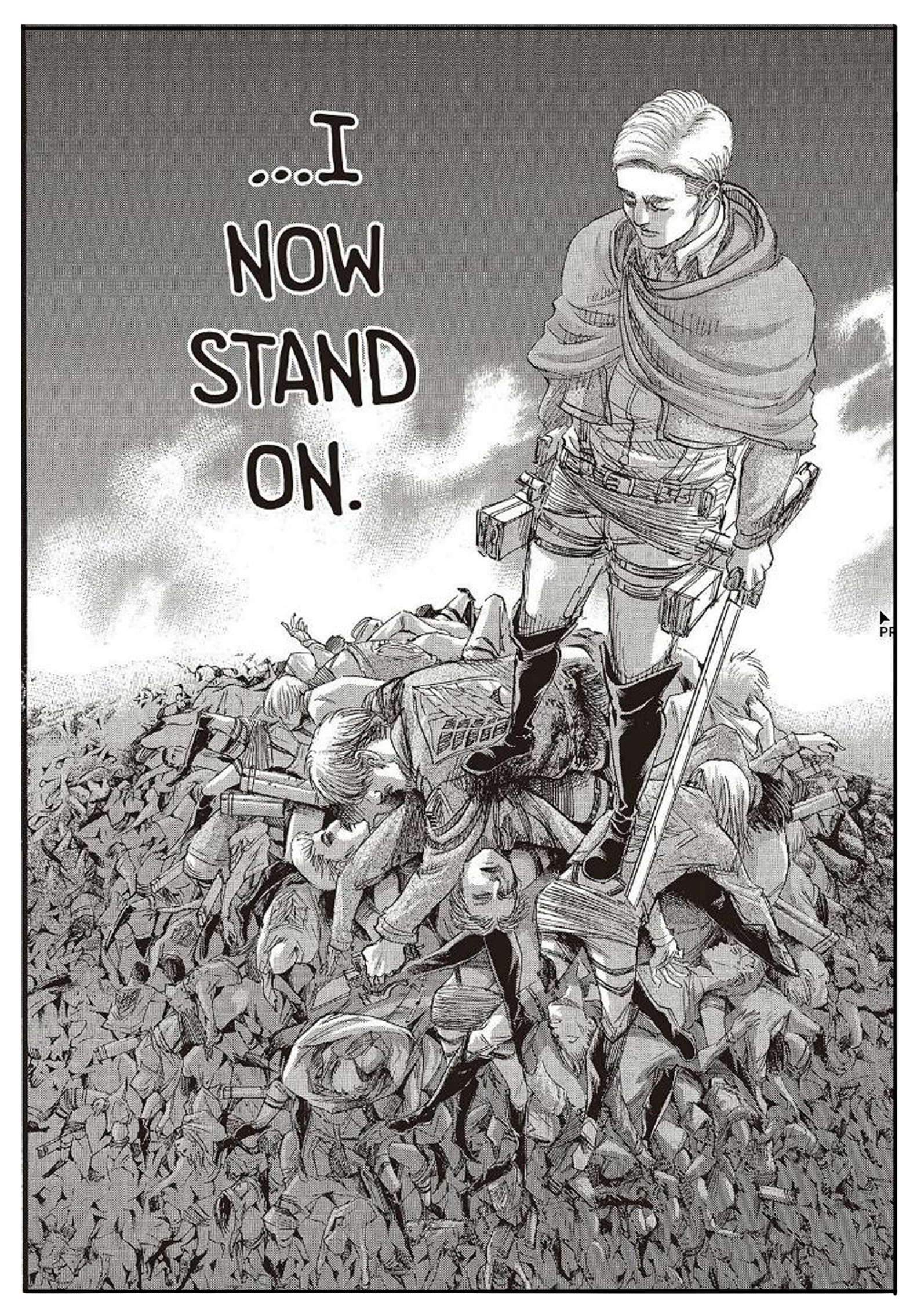
This is a reality that Eren himself recognises in the aftermath of the carnage at Shinganshina.
When they finally reach the basement that promised them answers to all their problems, they uncover the truth that a world of enemies awaits them and that all they have done is bought themselves some time.
As he ponders this dire situation, he thinks to himself, “I would easily give up my life, if it actually manages to change something”.
For all of Eren’s selflessness, he himself recognises that there is no sacrifice he can offer to alter the destiny of humanity to shred itself to pieces in hatred.
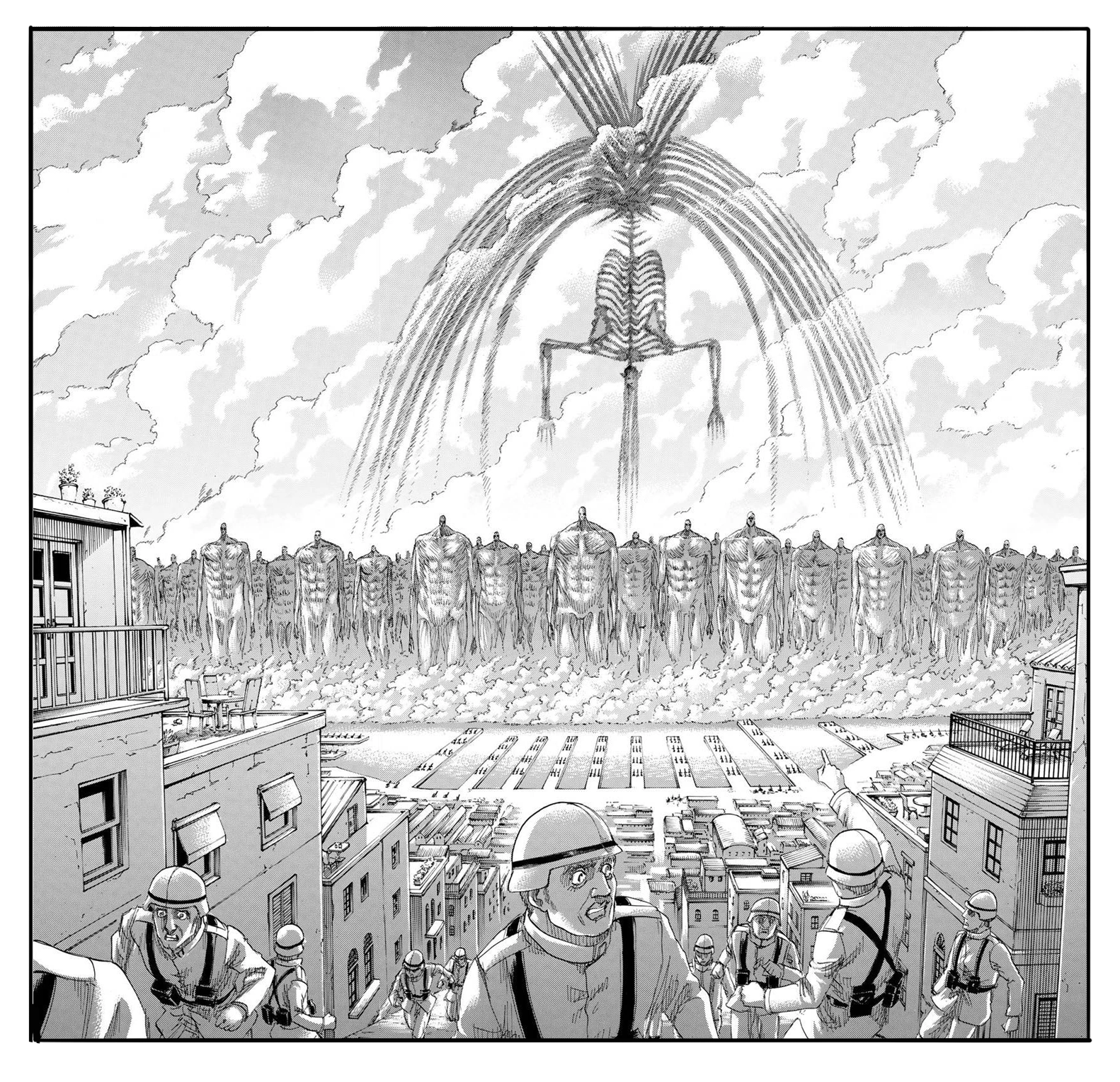
“Indeed, under the law almost everything is purified with blood, and without the shedding of blood there is no forgiveness of sins.” (Hebrews 9:22)
Just like Attack on Titan, the Bible itself recognises the need for sacrifice to solve an insurmountable problem — the problem of human sin.
A penalty has to be paid for sin, and it is a blood price. The wages of sin is death, and a sacrifice has to be offered for sin to cancel the invisible debt owed by humanity.
In Attack on Titan, the sacrifices are offered up in human lives, as battle after battle claims the lives of more and more people. In the Old Testament, the priests offered “repeatedly the same [animal] sacrifices, which can never take away sin” (Hebrews 10:11).
But the coming of the Lamb of God — who takes away the sin of the world — changed everything.
Jesus Christ “offered for all time a single sacrifice for sins” (Hebrews 10:12), and “by a single offering, he has perfected for all time those who are being sanctified” (Hebrews 10:14).
The story of Attack on Titan ends in hideous tragedy, with Eren unleashing his immense power to eliminate 80% of the world’s population in a global genocide called the Rumbling.
He etches his fury upon the steaming corpses of the world’s population in full cognisance of its utter futility as a worthy sacrifice. He offers up his own tarnished image as the Devil of the whole earth and takes the hatred of the world upon himself to purchase a merely impermanent peace.
The cycle of hatred, however, is not resolved. Paradis eventually finds itself embroiled in conflict once again centuries later, as Eren’s forgotten tomb lies inert beneath the battered earth.
But the story of the Cross is one of glorious, meaningful sacrifice.
It tells of the one who “upholds the universe by the word of his power” (Hebrews 1:3), offering Himself up as a perfect sacrifice to satisfy the holy wrath of God against sin. It tells of one who bore genocide upon genocide on His broken and tarnished frame, while His own soul burned bright, pure and unspotted.
It tells of the daylight fleeing and the earth beneath the cross rumbling as its Maker bowed His head in agony. It tells of an empty tomb that shines with eternal hope and a Lamb that will be honoured and remembered through all the ages.
It is the ultimate sacrifice by the God who laid aside His divinity to overcome the ultimate monstrosity of sin. There is no endless cycle in the story of the universe, and the Gospel has seen to that.
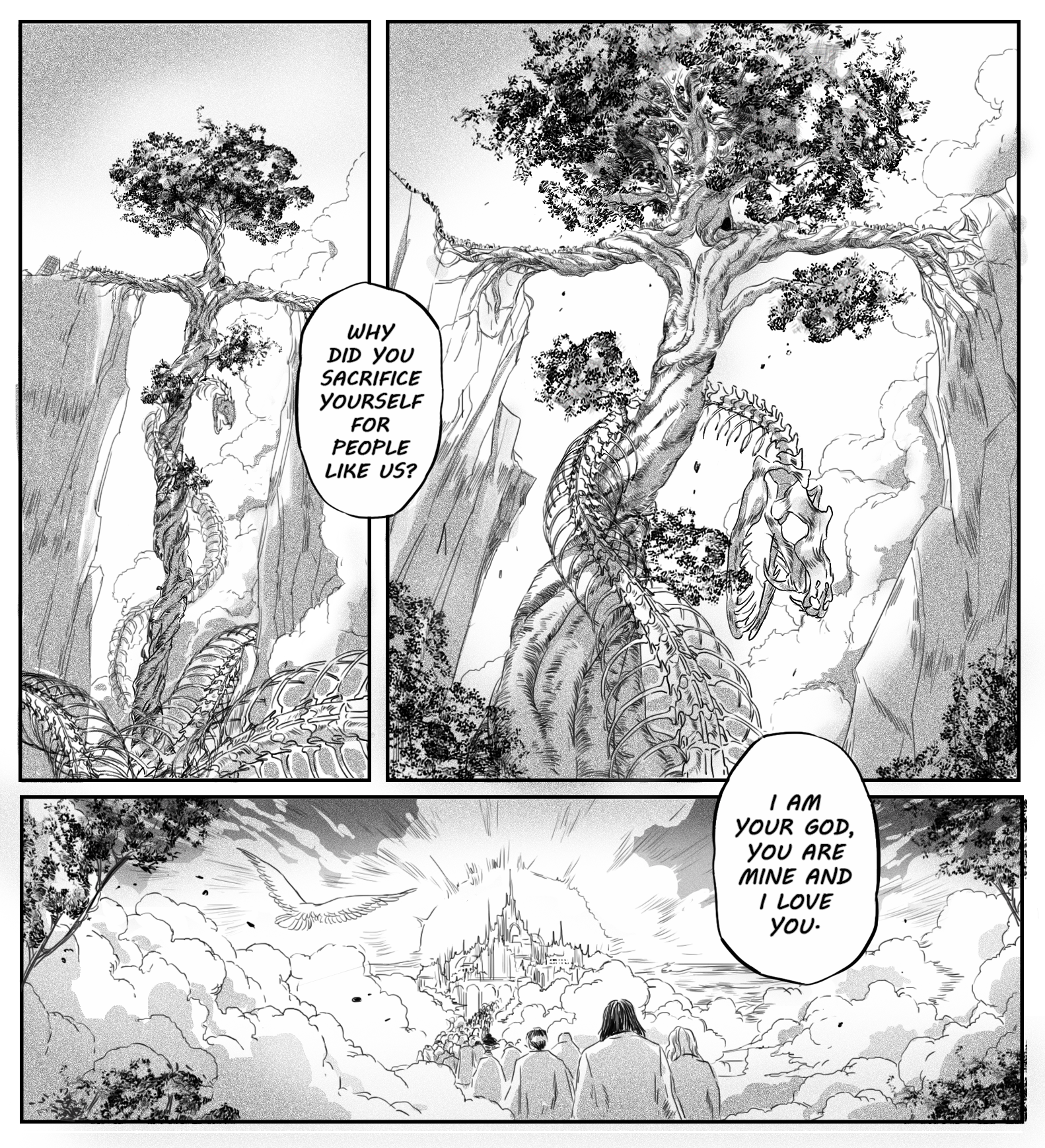
To conclude, Attack on Titan is a looking glass into the aching void of the human condition.
Through the themes of freedom, sin and sacrifice, Attack on Titan riles up the deepest longings of the soul and ends in bittersweet, disquieting, pathos.
But the light of the Gospel floods the darkness of Attack on Titan and the savage reality it mirrors with boundless hope.
If you watched the anime and questions like these have raced through your mind, come find the answers in what Jesus has done.
To Christians who have watched Attack on Titan, may its tragic story be a stark foil to the fullness of joy we have in Christ, and inflame our hearts with love and appreciation for every spiritual blessing we enjoy in Him (Ephesians 1:3).
For us who know “the prize of the high calling of God in Christ Jesus” (Philippians 3:14, KJV), this knowledge demands that we dedicate our hearts, and keep moving forward until the last enemy shall be destroyed (1 Corinthians 15:26).


